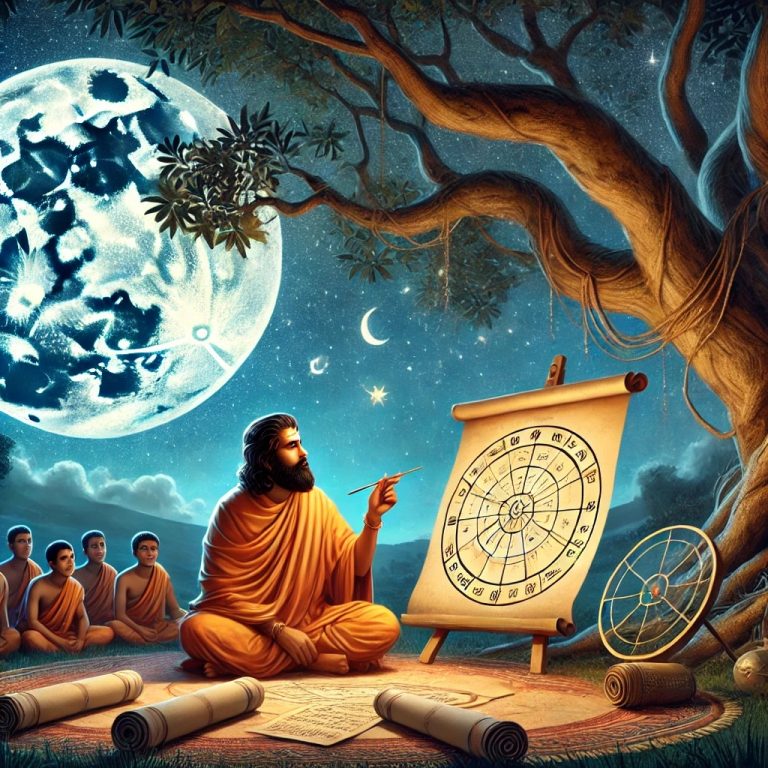Using Astrology and Ayurveda for Holistic Health: Healing Through the Stars
Holistic health is a concept that views the body, mind, and spirit as interconnected aspects of a person’s well-being. Two ancient systems that have long explored the intricate balance between these dimensions are Ayurveda and astrology. Each system brings its own rich insights into understanding human health, while combining the two creates a synergistic approach to fostering overall wellness. Ayurveda provides a time-tested framework for managing the physical, mental, and emotional body, while astrology offers a celestial perspective, guiding us through our unique cosmic imprints and planetary influences. When used together, these two systems can enhance our healing journey in ways that address not just the symptoms, but the root causes of imbalances.
Table of Contents
ToggleIn this blog post, we’ll explore how astrology and Ayurveda can be used in harmony for holistic health. We’ll delve into their foundational principles, their interplay in understanding your unique constitution, and practical tips for aligning your daily practices with the wisdom of the stars.
Introduction to Ayurveda
Ayurveda, often referred to as the “Science of Life,” is a 5,000-year-old system of natural healing rooted in the Vedic culture of India. It is a holistic approach to health, emphasizing balance in bodily systems and the interconnectedness of the body, mind, and spirit. Ayurveda’s central philosophy is that our health is governed by the balance of three vital energies, or doshas: Vata, Pitta, and Kapha. Each person has a unique constitution or Prakriti, which is a specific combination of these doshas. Understanding one’s dosha can help guide lifestyle, diet, and wellness choices for optimal health.
The Three Doshas
- Vata Dosha – Composed of air and space, Vata governs movement, creativity, communication, and the nervous system. People with a predominant Vata constitution are often energetic, quick-moving, and quick-thinking, but they may also suffer from anxiety, insomnia, or digestive issues if imbalanced.
- Pitta Dosha – Composed of fire and water, Pitta governs transformation, digestion, metabolism, and intellect. Pitta types are typically ambitious, driven, and sharp-minded but can experience anger, acidity, or skin irritations when out of balance.
- Kapha Dosha – Composed of earth and water, Kapha governs stability, structure, immunity, and fluid balance. People with a predominant Kapha dosha tend to be calm, grounded, and nurturing but may suffer from lethargy, weight gain, or attachment when imbalanced.
Ayurveda seeks to restore balance by recognizing when a dosha is aggravated and prescribing specific dietary, lifestyle, and herbal recommendations to bring harmony back into the body.
Introduction to Astrology
Astrology is the ancient science of interpreting the positions and movements of celestial bodies—especially the sun, moon, and planets—and their influence on human life. According to astrology, the position of the stars and planets at the time of your birth creates a unique natal chart or horoscope that acts as a cosmic blueprint for your life.
Astrology divides the sky into twelve zodiac signs, each ruled by different elements (fire, earth, air, water) and planetary rulers. The study of these signs, houses, and planetary aspects can provide deep insights into your personality, life path, and even health predispositions.
Key Astrological Components
- Sun Sign – Your sun sign, determined by the position of the sun at the time of your birth, represents your core identity, vitality, and life force. It shows how you express yourself in the world.
- Moon Sign – Your moon sign governs your emotional world, instinctual reactions, and subconscious tendencies. It reveals your inner needs and how you seek emotional fulfillment.
- Rising Sign (Ascendant) – The rising sign represents the mask you present to the world, your physical appearance, and how others perceive you.
- Planetary Aspects – The position of the planets and their relationships to each other (aspects) influence different aspects of life such as health, career, relationships, and emotional well-being.
The Connection Between Astrology and Ayurveda
Ayurveda and astrology have been intertwined for centuries, as both systems originated from the ancient Vedic tradition. In many ways, Ayurveda serves as the practical, Earth-based counterpart to the celestial wisdom of astrology. Together, they form a comprehensive approach to understanding human health and evolution.
Astrology and Doshas
Astrology can provide valuable insights into one’s Ayurvedic constitution by revealing the elemental makeup of a person’s birth chart. Each zodiac sign and planet carries an elemental influence that correlates with the doshas:
- Vata is associated with the air and space elements, and zodiac signs such as Gemini, Libra, and Aquarius. People with prominent Vata in their astrological chart may have creative, energetic, and flexible qualities but may also be prone to anxiety, irregular sleep, and digestive issues.
- Pitta is associated with the fire element and, to a lesser extent, water. Zodiac signs such as Aries, Leo, and Sagittarius are fiery and Pitta-like in nature. Individuals with strong Pitta in their charts are likely to be driven, ambitious, and intelligent, though they may struggle with anger, inflammation, or acid-related issues when imbalanced.
- Kapha is associated with the earth and water elements, and zodiac signs such as Taurus, Virgo, Capricorn, and Cancer. Kapha-dominant individuals tend to be grounded, stable, and nurturing, but may face issues like sluggishness, attachment, and water retention if imbalanced.
Planets and Health in Astrology
Each planet governs specific areas of the body and mind, and their placement in the natal chart can indicate potential health strengths and weaknesses. For example:
- Sun rules over the heart, spine, and overall vitality. An afflicted sun in your chart might indicate cardiovascular or energy-related issues.
- Moon governs the mind, emotions, and fluids in the body. A weak moon can manifest as emotional instability, anxiety, or digestive imbalances.
- Mars influences muscles, blood, and energy levels. A malefic Mars can result in inflammatory conditions, fever, or accidents.
By analyzing your astrological chart, an astrologer can identify which planets or aspects are causing health issues and offer guidance on how to mitigate their effects. These planetary influences can then be addressed through Ayurvedic practices like diet, herbal treatments, or yoga.
Healing Through the Stars: Ayurvedic and Astrological Practices
Identifying Your Constitution Through Astrology and Ayurveda
The first step in combining astrology with Ayurveda is identifying your unique dosha constitution and the dominant planetary influences in your chart. This understanding allows you to tailor your lifestyle, diet, and self-care practices to harmonize both your earthly and celestial imprints.
- Consult Your Natal Chart: Have your birth chart calculated by an astrologer or use an online tool. Focus on your sun, moon, and rising signs, as well as the dominant elements (fire, earth, air, water) in your chart.
- Match Your Chart to Your Dosha: Compare the elemental makeup of your chart with the qualities of Vata, Pitta, and Kapha. You might find that you have a Pitta dosha but a strong Vata influence in your chart, indicating a need to balance both types of energy.
- Track Planetary Transits: The current movement of planets, known as transits, can influence your health and well-being. For instance, when Mars is strong in the sky, Pitta energy may be heightened, leading to issues like inflammation or heat-related conditions. During these times, Pitta-pacifying practices, like cooling foods and calming activities, can help maintain balance.
Harmonizing Diet with Astrology and Ayurveda
Both astrology and Ayurveda emphasize the importance of food in maintaining health. Just as Ayurveda tailors diets based on dosha imbalances, astrology can guide dietary choices based on planetary influences.
- Vata-Predominant People or During Vata Season (Fall): Favor warm, moist, and grounding foods like soups, stews, and cooked vegetables. Avoid raw and cold foods, which aggravate Vata. Pay attention to the moon cycles, as lunar energy affects Vata significantly. Eating grounding meals around the full moon can stabilize emotional and physical energy.
- Pitta-Predominant People or During Pitta Season (Summer): Focus on cooling, hydrating foods such as cucumbers, leafy greens, and coconut water. Avoid spicy and acidic foods, which can increase Pitta. Mars transits may exacerbate Pitta energy, so cooling herbal teas like peppermint or coriander can be beneficial.
- Kapha-Predominant People or During Kapha Season (Spring): Light, dry, and stimulating foods like lentils, quinoa, and steamed vegetables help balance Kapha. Avoid heavy, oily, or sweet foods that contribute to sluggishness. During periods of Venus or Jupiter prominence, which increase Kapha energy, focus on detoxifying practices like fasting or consuming bitter greens.
Lifestyle Practices for Holistic Healing
Ayurvedic routines and astrological cycles can guide your daily habits, exercise, and sleep routines to maximize well-being.
Align with the Sun and Moon Cycles: The sun governs vitality and energy, while the moon influences emotions and rest. Adopting Ayurvedic practices like waking with the sun and winding down with the moon can help balance your circadian rhythm.
Yoga for Doshas and Planetary Influences:
- Vata: Gentle, slow-paced yoga practices like Hatha or Yin yoga can help ground scattered Vata energy. Pay attention to the lunar cycle, as Vata individuals may be more sensitive to changes during the full moon
- Pitta: To cool fiery Pitta, practice yoga styles that are calming and non-competitive, such as Restorative Yoga or Moon Salutations (Chandra Namaskar). Forward bends, twists, and poses that open the heart center, like Camel Pose (Ustrasana) or Cooling Pranayama (like Sheetali breathing), help release heat and tension from the body and mind.
- Kapha: Stimulating yoga practices like Vinyasa Flow or Ashtanga are ideal for Kapha types, as they increase energy and circulation. Incorporating invigorating postures such as Sun Salutations (Surya Namaskar), Backbends, and Inversions will help move stagnation, boosting metabolism and vitality.
Daily Routine (Dinacharya): According to both Ayurveda and astrology, establishing a routine that honors the natural rhythms of the day is essential. Ayurveda’s daily routine or Dinacharya emphasizes waking up early (ideally before sunrise) to align with the Sattvic (pure) qualities of the morning, practicing self-care rituals like tongue scraping, oil pulling, and Abhyanga (self-massage), followed by gentle exercise and meditation.
From an astrological perspective, you can further customize this daily routine based on planetary influences. For instance, aligning spiritual practices with the moon’s waxing and waning cycles can enhance emotional balance, while taking on new challenges or setting intentions during periods of strong Sun or Mars influences can boost motivation and energy.
Planetary Remedies (Upayas) and Ayurvedic Remedies
Astrology offers specific remedies (called Upayas) to mitigate planetary afflictions, and Ayurveda provides natural remedies to balance doshas. Combining these systems can result in highly personalized healing strategies:
Planetary Mantras and Meditation: Reciting specific mantras related to afflicted planets can balance their negative effects. For example, if Saturn (Shani) is causing delays or depression, chanting the mantra “Om Sham Shanaischaraya Namaha” can help reduce its malefic influence. Pair this with meditation practices that balance your dosha. For instance, a Pitta person may benefit from cooling and heart-centered meditations, while a Vata person may focus on grounding and stabilizing breathwork.
Herbal Remedies Based on Planetary Afflictions: Ayurveda offers a vast pharmacopeia of herbs to balance the doshas, and many of these herbs also correspond to specific planetary energies.
- For Sun-related imbalances (which affect vitality and heart health), Ayurvedic herbs like Ashwagandha and Arjuna can support vitality, energy, and cardiovascular health.
- For Moon-related imbalances (which govern emotions and fluids), herbs such as Brahmi and Shatavari can help calm the mind and support reproductive and hormonal balance.
- For Mars-related imbalances (which govern blood, muscles, and heat), cooling herbs like Aloe Vera, Turmeric, and Sandalwood can reduce inflammation and support a calm, balanced nervous system.
- Gemstones and Crystals: In Vedic astrology, gemstones are used to balance the energies of specific planets. Wearing the right gemstone can help harmonize planetary energies in your chart.
- Ruby is often used to enhance the Sun’s energy, boosting confidence and vitality.
- Pearl is used to strengthen the Moon’s energy, supporting emotional resilience and calmness.
- Red Coral is recommended for Mars, helping to reduce anger and promote courage and physical strength.
- Wearing these gemstones on specific days (e.g., Sunday for the Sun, Monday for the Moon) can enhance their healing effects, while Ayurveda complements this practice with herbal treatments and dietary recommendations to support the corresponding doshas.
Seasonal and Cosmic Cycles: Ayurveda and Astrology in Sync
Both Ayurveda and astrology recognize the impact of seasons and planetary movements on health. Ayurveda categorizes the year into three main seasons (Vata, Pitta, and Kapha), each associated with different qualities and requiring different balancing strategies. Astrology, on the other hand, tracks the movement of the planets and the shifts in zodiac seasons.
Vata Season (Fall and Early Winter): As the air becomes colder and drier, Vata energy can become elevated. Astrologically, this corresponds with zodiac signs like Libra, Scorpio, and Sagittarius, which are associated with transformation and movement. During this time, Ayurveda recommends warm, nourishing foods, grounding practices, and adequate rest to balance Vata.
Astrologically, paying attention to transits of fast-moving planets like Mercury (which rules communication and nervous energy) can help manage potential Vata imbalances like anxiety and restlessness. Practices like journaling and calming meditation during Mercury transits can be beneficial.
Pitta Season (Summer): With the heat of summer comes an increase in Pitta energy. Astrological signs like Leo, Cancer, and Virgo dominate this period, reflecting themes of leadership, health, and service. To balance Pitta during this time, Ayurveda suggests cooling foods, regular hydration, and calming, non-competitive activities.
Astrological transits of Mars and Sun, which increase heat and intensity, can further aggravate Pitta. Keeping an eye on these planetary movements can help you time cooling practices, like moon salutation yoga sequences, or avoid heated confrontations and overexertion.
Kapha Season (Spring): Spring is associated with growth and renewal, but it can also be a time of sluggishness and stagnation due to excess Kapha. Signs like Taurus, Pisces, and Aries rule this season, highlighting the need for grounding and steady progress.
During Kapha season, Ayurveda advises a light, detoxifying diet and stimulating activities to combat lethargy. Astrologically, paying attention to Jupiter and Venus transits (which amplify Kapha’s nurturing and luxurious qualities) can help you stay focused on health goals and avoid overindulgence.
Holistic Healing Strategy:
- Ayurvedic Diet: Cooling, calming foods (like cucumber, coconut, and leafy greens) to balance both Pitta and Vata, and avoid spicy, hot, and oily foods that aggravate her condition.
- Planetary Remedies: She can chant Mars mantras to mitigate its negative effects and wear a green emerald to strengthen her Mercury. Additionally, Sheetali pranayama (a cooling breathwork practice) can reduce Pitta heat and calm the mind.
- Lifestyle Adjustments: Early evening meals and winding down with meditation aligned with the moon phases (especially during a waning moon, when Vata is more active) can help balance her sleep and emotional well-being.
Conclusion
The combination of Ayurveda and astrology provides a comprehensive, personalized approach to holistic healing. By understanding the unique interplay between your dosha constitution and the cosmic energies influencing your life, you can create a roadmap for health that is grounded in both the earthly rhythms of nature and the celestial wisdom of the stars. Whether you’re seeking physical healing, emotional balance, or spiritual growth, the synergy between Ayurveda and astrology offers profound tools to guide you on your journey. By listening to the wisdom of your body and the stars, you can foster a deeper connection with yourself and the universe, achieving a truly holistic state of health and well-being.





